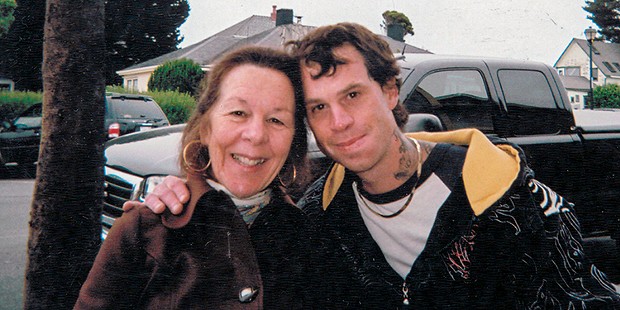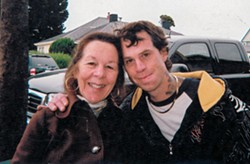'The Hollow Men'
The life and death of Daren Borges
By Thadeus Greenson [email protected] @ThadeusGreenson[
{
"name": "Top Stories Video Pair",
"insertPoint": "7",
"component": "17087298",
"parentWrapperClass": "fdn-ads-inline-content-block",
"requiredCountToDisplay": "1"
}
]
Before the arrest and the sobering cell, long before the civil rights lawsuit or the $2.5 million verdict, there was a call for help. It was shortly after 2 p.m. on June 13, 2014, and 42-year-old Daren Borges was in a bad way. Near the intersection of Seventh and D streets in Eureka, just down from Best Dry Cleaners, Borges was behaving erratically, taking off his clothes and jabbering incoherently. He appeared to be throwing himself on the ground. Seeing all this, someone picked up the phone and called 911, saying someone needed to come and check on him. He needed help. Dispatch sent a police officer.
Within two hours, Daren Ethan Borges — the artist, the poet, the brother, the son, the ex-convict, the drug user, the homeless schizophrenic, the optimist — was lying dead in a sobering cell at the county jail.
Exactly what happened and why Borges died that day three years ago would be parsed and dissected, interpreted and argued. On Aug. 28, a federal jury found that jail staff had been negligent in failing to have a nurse or doctor evaluate Borges before putting him in that sobering cell, denying the man the rights guaranteed him under the 14th Amendment of the U.S. Constitution, depriving him of life, liberty and property without due process. The jury awarded Borges' mother $2.5 million.
In the aftermath of the verdict, Nancy Delaney — an attorney representing the county — has already filed a motion challenging the verdict and says she plans to file another. U.S. District Court Judge Yvonne Gonzalez Rogers, who heard the case, has already warned Delaney that evidence in the case was "pretty substantial" and her motions will likely fail. But if they do, it seems likely the county will appeal. Sheriff William Honsal, who took over the post earlier this year from now-retired Mike Downey, who was named in the lawsuit but cleared of wrongdoing, has meanwhile said jail staff feel like they did everything possible for Borges.
But a jury felt otherwise. And, quietly, the sheriff's office has already changed its policy to ensure the next time someone is arrested for public intoxication after a welfare check, they are treated differently than Daren Borges was.
Born Feb. 9, 1972, the son of an educator and a medical researcher in Orange County, Daren Borges never seems to have had it easy.
Borges was born very hard of hearing, the result of a pregnancy that went past term, according to his mother, Stephany Borges. He had to wear hearing aids and was slow to develop speech, which landed him in special education classes. "He always wanted to be normal just like everybody else," his mom says, adding that he was a sweet kid.
The family traveled a lot and Stephany Borges recalls one trip to Bogota, Columbia, when Daren was about 10 and he saw a homeless person for the first time. "We saw this woman outside who had fallen down and was lying in the street," she recalls. "Security came and roughly threw her in the park. At Daren's insistence, we found a place for her to stay in the church, then brought her food every day."
A few years later, she recalls a trip to Europe, where she took Daren to see the Museum of Modern Art in Amsterdam and he became enraptured by the modernist abstracts. "He said, 'This is art? Can this be art? People pay money for this? But, mom, I can do it.'" So Daren Borges started painting and drawing, and art became a lifelong passion.
Mainstreamed back into traditional classrooms in fourth grade, he also came around and started doing well in school, Stephany Borges says, though he always felt different, like his hearing aids made him stand out. When Daren was 12, his parents welcomed a daughter, Sofia, into the family.
"He completely adored her," Stephany Borges says.
But new challenges would soon emerge as Daren Borges entered adulthood and schizophrenia began to take hold, blurring the relationship between his thoughts, emotions and actions, leading to faulty perceptions, inappropriate behaviors, delusions and a sense of mental fragmentation.
Stephany Borges says she started seeing symptoms when her son was 18 but she thought he was just acting out, as teens do. "I think at 19, he had a psychotic break but it looked like crazy behavior," she says. "He got on a train and went to Indiana one day with nothing. Another day, he stole some stuff from a convenience store. They just keep doing weird stuff and it gets harder and harder to get them out of it. It was a terrible time. He just did impulsive things that got him into trouble."
For Sofia Borges, some of her earliest memories are during this time period.
"I just wanted him to be safe, wanted him to be OK," she says. "When he was doing well, it was so fun. We'd hang out and listen to music but I didn't understand what was happening. It was a very tumultuous time."
Borges' family is largely unwilling to talk publicly about the depth of his problems and run-ins with the law. But what's clear is that Daren Borges had many. (One filing in the lawsuit references his 12-page rap sheet, much of it for public intoxication and possession cases). And it's clear that Sofia and Stephany Borges feel that each arrest and incarceration left him with more damage and more trauma.
"Over time, the system really failed him, failed my family," Sofia Borges says.
Stephany Borges recalls a time, after a minor transgression, when she worked hard to help get her son a work placement with the California Conservation Corps in lieu of incarceration. In short order, he wandered off and his legal troubles worsened.
Through it all, she chuckles, Daren Borges kept a sense of humor, resolute that all this worrying and hand-wringing over him was silly.
"When he was going through the beginning of his crazy behavior, he knew I was worrying about him so, one day, he came downstairs dressed in two different shoes, his shirt inside out and different socks," she says. "He could see me thinking. He knew what other people were thinking and he was always kind of laughing."
She pauses.
"He had the most beautiful laugh. It's a crazy laugh, but a beautiful laugh."
As he got older, into his 20s and beyond, Daren Borges resisted his family's efforts to help him. He moved away from Southern California to Eureka, where his grandmother and aunt lived, and Stephany Borges says there came a point when she had to step back, had to make a choice between pushing her son toward treatment and having a relationship with him.
"He didn't want anyone to tell him, to force him to do things," she says. "He wanted his independence, no matter what that looked like. At that point, he felt like people were going to take things away from him. ... I never wanted him to go missing."
In 1998, Stephany Borges also moved north to take a job teaching in Humboldt State University's new women's studies department. She says she always kept in touch with her son.
Local philanthropist Betty Chinn, who's spent three decades feeding and caring for Eureka's homeless, says she came to know Daren Borges when he moved to Eureka. "He was out there for a really long time — young age," she says.
Chinn says she would sometimes see him doing OK, others he would be passed out on the street. She says Stephany Borges called her a handful of times seeing if there was something Chinn could do to help her son, if there was something Stephany was missing. "The mom tried," Chinn says. "She really tried."
After one of these calls, Chinn says she approached Daren. "I asked about his mom. He said she had done everything she could for him already," Chinn recalls. "He was a good man. Deep inside, he had goodness, but the mental illness and the drugs knocked him down."
One Eureka police officer who had frequent contacts with Daren Borges says it was obvious there was an underlying mental illness at play. "It was always clear mine wasn't the only voice he was hearing," the officer says.
Sofia Borges marvels at how her brother kept drawing and kept writing, kept learning and kept sharing. "He loved corresponding and communicating, so he wrote letters. I should have written more," she says, adding that her brother would write about what he was eating, what he was thinking about, dreaming about, seeing, just "stream of consciousness." He'd send comic strips cut out from the newspaper, a favorite poem (often by T.S. Elliot) he'd transcribed or one he'd written, all on what he could find — discarded envelopes and fliers, scraps of binder paper, whatever he had.
"He always found the light," Sofia Borges says of her brother, recalling one time when she received a beautiful drawing on the back of a Humboldt County jail inmate request form.
"He was hungry. He was always starving. He loved cookies, hamburgers, Dr. Pepper, Red Vines. He had this insatiable appetite. He loved to relate to people. He loved his coffee. He loved his thesaurus. He just cared. He was loyal and not just toward me but toward everyone. He was this eternal optimist. If he had money, he gave it away. If he had an idea, he shared it. If he cared about you, he said so."
Daren Borges sent his mom a last letter on June 6, 2014. In it, he tells her he loves her three times, expresses his excitement about getting out of jail on June 10 and his hope to never again be incarcerated. About to leave jail for the first time in two months after a probation violation, he promises Stephany Borges he'll get her a present for her birthday — June 12 — and warns it will be late. But he promises to call. He tried but didn't catch her. When some passersby found his phone the next day on the ground near Seventh and D streets in Eureka, it had just one phone number programed into it, under the name "mom."
Watching the last hours of Daren Borges' life unfold on law enforcement cameras is a horrifying look at a life deteriorating under the weight of mental illness and drug intoxication.
The first video was captured by a camera mounted in the back seat of then Eureka police officer Michael Stelzig's patrol car. An officer places Borges, still handcuffed, into the patrol car's rear driver's seat. Clad in blue jeans with his brown hair cropped short to show his receding hair line and tattoos peaking out from his gray/blue t-shirt, Borges sits for almost 20 seconds, his eyes trained in front of him, his brow furrowed. He's breathing heavily.
"Two packs, three packs," he says in almost a singing voice before bumping his knee into the divider in front of him and turning his head sharply to the left. "What'd I say? Indecent exposure? Come on. Indecent exposure, what?"
Over the next 14 minutes, as Stelzig drives to the jail, parks and leaves him in the patrol car for several minutes as he readies paperwork, Daren Borges appears to deteriorate. His eyes bulge as he mutters unintelligibly, veins visible on his sweaty forehead and neck. He sways from side to side and scrunches his face up intermittently. He makes kissing sounds and talks to himself. It's hard to make out but he talks or mutters almost constantly, seemingly independent of the officer driving him or the chirping police radio.
About seven minutes into the video, you hear Stelzig's voice as he calls over to the jail.
"I've got a male that's not combative but he's quite amped up ... like amped up, methed out," Stelzig says.
"Oh, OK. I'll let them know," a voice responds.
"Daren, you going to play nice?" Stelzig asks Borges a moment later. He continues to mutter unintelligibly, leaning forward to wipe sweat from his forehead onto the knee of his jeans as the patrol car pulls into the parking bay under the jail.
Stelzig then leaves Borges alone in the car for about five minutes as he prepares for booking. Borges sweats profusely in the back of the car, even though its windows are down, as he talks constantly and incoherently, saying women's names, swearing, muttering to himself. At one point, he leans forward and kisses his knee, then scrunches his face and makes a spitting sound, as though he tasted something bitter and is trying to get it off his tongue. At times he looks in pain, at others he laughs. He begins to sweat through his t-shirt. He moans. He grimaces. Then the car door opens.
"Daren, what the fuck's going on, what'd you do, fall off the wagon?" a male officer asks.
"Yeah," Borges replies.
The officer gets him out the car, watches as he walks across the underground parking area and sits him in a plastic chair outside booking, waiting for another suspect to clear the process. Borges waits in that plastic chair for about 10 minutes, his body mostly still but his head in near constant motion, until the booking room is cleared and Stelzig gets him on his feet.
When he enters the booking room — a rectangular cinder block room with built-in desks on three walls — Borges walks directly to a rectangular blue pad that hangs on the room's west wall. This is where correctional officers pat-down suspects. Borges walks to the pad and leans into it head first at an awkward angle. He lists left, then right. There's no sound in the jail videos, so it's hard to tell if he and Stelzig are talking, but it's clear the officer redirects him to the mat at least a couple of times, as Borges lists and staggers away.
It takes a few minutes for the correctional officers to enter, Terri Bittner first then David Swim. Under the sheriff's office's protocol at the time, the officers are supposed answer 35 questions as a part of the booking process, 24 asked to the suspect; the others based on officers' observations — physical signs of trauma, the appearance of intoxication, whether he or she seems oriented to self, date, time and place.
Under the policy, if correctional officers are concerned about the physical state of a suspect, they're required to call a registered nurse down from the jail's medical unit to evaluate him or her. It's then up to the nurse to decide whether the suspect is to be booked into the facility or sent to a hospital for further evaluation.
From the video, it's impossible to know what's said between the officers and Borges, but they are in the room for about a minute when they begin patting him down. Eventually, another officer — Tim Hammer — enters and, with Bittner, helps hold Borges upright as Swim takes off his shoes and socks. Then, they escort him from the booking area to a sobering cell. The entire booking process spans about two minutes and 40 seconds, from the time Bittner enters the room to when the three officers escort Borges out.
Current Humboldt County Sheriff William Honsal says there's nothing codifying that the jail's questions have to be administered before the pat-down begins. In fact, the questions and dialogue can de-escalate the tensions of the hands-on process. If that's what happened with Borges, there doesn't seem have been much dialogue. And none of the officers can be seen taking any notes.
The three officers escort Borges down the hall and into a sobering cell — a small rectangular room with nothing but a metal toilet and sink, a drain in the center of the floor and three small windows looking out on the hallway. Once in the cell, the officers appear to push Borges to his knees, and then struggle for about a minute to get his handcuffs off. Then, all three quickly exit and return down the hall.
Swim fills out Borges' booking questionnaire, indicating that he doesn't seem "oriented to self, date, time and place" and that he appears under the influence of an unknown substance. He indicates Borges was placed in a sobering cell, with medical called to come see him there. He answers no to all other questions, including the 24 that policy dictates be asked of suspects.
Alone in the cell, Borges stays on the ground a moment, flailing his legs and rolling over to the small window in the door. He appears as though he may be trying to get someone's attention for a moment before splaying onto his back, pulling up his shirt and crawling over to the toilet, which he uses to splash water on his face and head. He takes off his pants and dips them into the toilet bowl. He then does the same with his shirt.
An officer comes to his cell to place an observation sheet near its door, which officers will use to note Borges' condition every 15 minutes. The officer doesn't appear to look into the cell.
Back inside, Borges is now completely naked and using the sink to splash water over his face and head. He passes frantically along the walls of the small cell, smacking himself in the head, kicking his clothes along the floor. He's in constant motion. He falls to the floor and writhes, climbs to his knees and throws his clothes in the air. He lies in the fetal position for a moment only to sit back up, grab his pants and tear at them before throwing them against the wall. He crawls in circles. He spins and flails, sliding on the now wet floor. He smacks himself, smacks the walls, and keeps returning to the sink and toilet to splash water on himself.
When an officer comes to check on him after about 15 minutes, Borges is naked on his back, his wet pants on top of him, his legs flailing. The officer watches for a moment, marks "moving" on the sheet and returns to the front desk. Borges' behavior continues.
About 20 minutes after he's put in the cell, a nurse comes and looks through the window. She observes for about two minutes and 15 seconds as Borges swings his pants at the floor, as if swatting invisible flies, ventures back to the toilet, appears to mount a small privacy partition and then flails on the ground near the cell door. The nurse appears to take some notes then leaves.
Borges scoots around the cell on his back. When an officer comes to observe him about eight minutes later, he's still on his back, swinging his legs in the air and using them to throw his clothing around the cell. After the officer leaves, Borges rises to his feet and leans heavily on the partition as he makes his way back around to the toilet. He never makes it back to his feet. Instead, he crawls, wriggles and writhes his way around the cell until he ends up on his side, his back to the far wall opposite the toilet. His legs churn for a minute then go still, his left leg jutted out straight, his right cocked behind it at an awkward angle. Some minutes later, an officer would note he was on his side, breathing.
When an officer returned 12 minutes later, Borges lay in the same position. Another check 14 minutes later found him the same. When an officer returned 15 minutes later, something caught his attention. He asked for backup and entered the cell.
It was too late. Daren Borges was dead.
Daren Borges was officially pronounced dead at 4:34 p.m. at St. Joseph Hospital on that Friday. For reasons still unclear, his mother wasn't notified until the following Monday.
Stephany Borges says a lawsuit was the furthest thing from her mind when her son died. But she kept looking for answers and not finding them. Stories changed, she says, and little things began to add up.
"This sounds really small, but they wouldn't give me back his clothes," she says. "They said they were holding them for investigative purposes."
Ultimately, Stephany Borges enlisted the help of Southern California attorneys Dale Galipo and John Fattahi, who filed a lawsuit charging that Daren Borges' civil rights were violated by a host of officers with the Eureka Police Department and the Humboldt County Sheriff's Office, as well as California Forensic Medical Group, Inc., the company that provides medical services at the jail on a contract basis. But U.S. District Court Judge Yvonne Gonzalez Rogers dismissed the case against Eureka and its officers, and Galipo said California Forensic Medical Group agreed to settle its portion of the case for $250,000. The county, Galipo said, never made a settlement offer.
That left the county, former Sheriff Mike Downey and four correctional officers — Swim, Bittner and Hammer, as well as their supervisor, Tim Hershberger — as the only defendants in the suit when it went to trial Aug. 21.
At trial, Galipo argued that the correctional officers, whom he said the county had failed to adequately train, didn't follow policy and acted negligently when they rushed Borges through the booking process — despite his being disoriented, incoherent and obviously intoxicated — and placed him in a sobering cell instead of summoning a registered nurse to medically screen him. Any reasonable officer acting in these officers' place would have seen Borges was suffering a medical emergency and gotten him to a hospital, Galipo said, adding that doing so would have likely saved Borges' life.
Representing the county, Nancy Delaney countered that the correctional officers did everything they could and that Borges appeared to be aware of his surroundings and coherent when he was booked. And she pointed to the nurse who checked on him through his cell window within 20 minutes of his being booked and saw no reason for alarm. Sure, Borges was amped up and flailing around, but that's typical of methamphetamine users booked into the jail, Delaney said, adding that it's also customary for them to fall into a deep sleep after a time. Borges' death was "tragic and sad," she said, but unpreventable after he ingested a potentially lethal dose of methamphetamine.
In their closing arguments, both Delaney and Galipo pointed to Stelzig, who testified at trial that it appeared to him that Borges was deteriorating, that he was incoherent and couldn't answer simple questions during the booking process. Delaney argued that the former officer's testimony simply wasn't credible.
The jury apparently disagreed, finding that Hamer, Swim and Bittner acted negligently and without proper training when they failed to have Borges medically screened before admitting him to the jail, and that the county had failed to adequately train its officers. (The jury cleared Downey of a charge that he was responsible for disregarding a known training deficiency and allegations that the officers involved acted with malice.)
The jury awarded Stephany Borges $2.5 million in damages.
After the trial, Galipo credited the jury for taking the case seriously and valuing the life of a man who was clearly lost and in distress — addicted, mentally ill and homeless at the time of his death. The trial, he said, is about the fact that every one of us has basic constitutional rights, and if the jail is going to incarcerate one of us, it better ensure those rights are protected.
"I think it was the right verdict," he said. "I think it was a courageous verdict."
A week following the verdict, Honsal is leading the Journal on a tour of the booking area of the Humboldt County jail. A lot has changed since Borges died here, he says, though he disputes there was a direct correlation between the man's death and the policy changes. Instead, he points to a lawsuit brought a couple of years ago against Monterey County, which also contracts with California Forensic Medical Group, alleging the jail failed to adequately screen arrestees or give them proper medical care once they were booked.
Back in December, Honsal says the jail changed its policy to require that a registered nurse screen every single person booked into custody. In the process, nurses take every suspect's blood pressure, pulse and temperature, and fill out a four-page questionnaire that resembles a hospital intake form. The new policy — which was fully implemented in February, when additional nurses were hired — has slowed down the booking process and demands more of local officers, taking more time away from their normal beats and patrols. It also results in more suspects being denied admission and being sent to St. Joseph Hospital for further evaluation, which can frustrate officers and hospital staff alike.
"Everyone wants us to help with the meth problem — the so-called 'zombies' walking the street — but this is the only place for them," Honsal says, clearly a bit frustrated, adding that it's incumbent on the sheriff's office to make sure the jail is a safe place for these people to be. "This lawsuit proves that's the standard people want and expect us to adhere to."
On the phone last week from her home in Arizona, Stephany Borges seems stunned silent for a moment when told of the jail's new screening policies.
"I can't believe that," she says. "That would have saved Daren's life. That's good news. That's brilliant."
In an email last week, Sofia Borges wrote that the trial took a heavy toll.
"I never expected or wanted to grieve publicly," she wrote. "I never wanted Daren, me and my family picked apart by Internet trolls. I never wanted to hear how much his heart weighs and listen to strangers speculate about whether or not his life had value. This is the price of asking for reform."
Stephany Borges feels much the same. She also wonders how her son's life might have changed, saying that for some people, schizophrenia loosens its hold in later adulthood.
"The thing I'm most sad about is that for so many years, I thought my job was to change him and fix it, and I wish I had just been able to be with him and love him," she says.
Sofia Borges also has regrets. When she smells the rocky road cookies baking at a shop around the corner from her house, she regrets that she'll never get to take her brother there. She wishes she'd written more letters, that she'd stayed closer instead of working abroad in Berlin for a few years, moving back stateside only to get a phone call notifying her of his death a week later.
"It really puts into perspective that sometimes you don't get a next time or another chance or a future with someone — that's what I have to live with," she says.
After a long pause, Sofia Borges shares one of her favorite memories of her brother. It was his 20th birthday, which would have made her about 8 at the time. The family had a pizza party for him — nothing big, just the four of them.
“He was doing really well — I was doing pretty good and he was doing well,” she says, her voice trailing off. “It was just that kid stuff. I just wish we’d had more good times when he was free of mental illness and free of the system. I just wish he was free.”
Thadeus Greenson is the Journal's news editor. Reach him at 442-1400, extension 321, or [email protected]. Follow him on Twitter @thadeusgreenson.
Speaking of...
-

HCSO to Allow Family of Inmate to Donate Organs
Dec 1, 2023 -

EPD Investigating Stabbing Death
Aug 3, 2023 -

Prominent Foster Parent Arrested in 'Lewd Acts' Investigation
May 24, 2023 - More »
Comments (6)
Showing 1-6 of 6
more from the author
-
Court Rejects Zoellner Appeal
- Jun 28, 2024
-
Change of Plea Hearing Set in Fair Embezzlement Case
- Jun 27, 2024
-
Journal Welcomes California Local News Fellows
- Jun 27, 2024
- More »
Latest in News
Readers also liked…
-
Through Mark Larson's Lens
A local photographer's favorite images of 2022 in Humboldt
- Jan 5, 2023
-
'To Celebrate Our Sovereignty'
Yurok Tribe to host gathering honoring 'ultimate river warrior' on the anniversary of the U.S. Supreme Court ruling that changed everything
- Jun 8, 2023





































